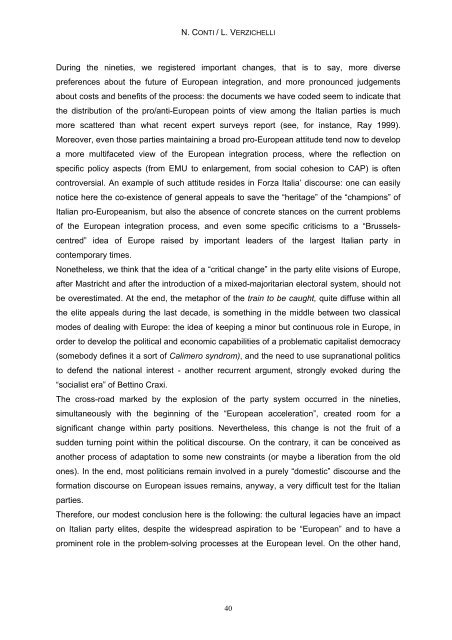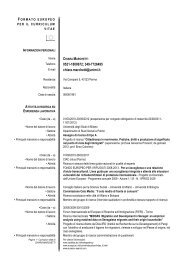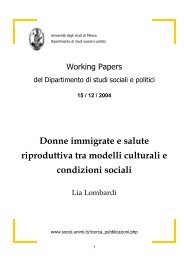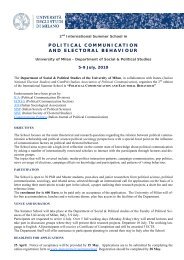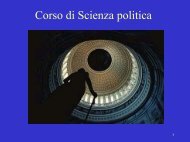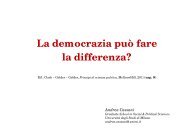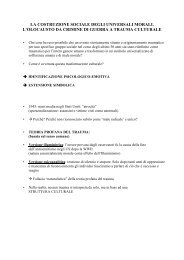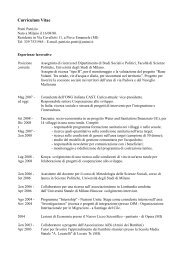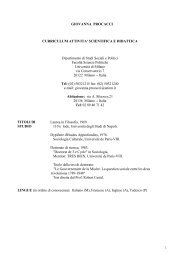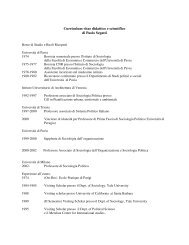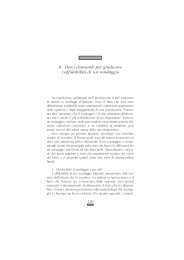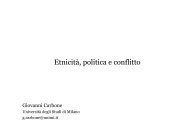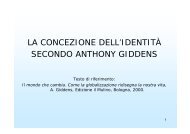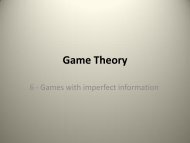The european dimension of political discourse in Italy. A ... - CIRCaP
The european dimension of political discourse in Italy. A ... - CIRCaP
The european dimension of political discourse in Italy. A ... - CIRCaP
You also want an ePaper? Increase the reach of your titles
YUMPU automatically turns print PDFs into web optimized ePapers that Google loves.
N. CONTI / L. VERZICHELLI<br />
Dur<strong>in</strong>g the n<strong>in</strong>eties, we registered important changes, that is to say, more diverse<br />
preferences about the future <strong>of</strong> European <strong>in</strong>tegration, and more pronounced judgements<br />
about costs and benefits <strong>of</strong> the process: the documents we have coded seem to <strong>in</strong>dicate that<br />
the distribution <strong>of</strong> the pro/anti-European po<strong>in</strong>ts <strong>of</strong> view among the Italian parties is much<br />
more scattered than what recent expert surveys report (see, for <strong>in</strong>stance, Ray 1999).<br />
Moreover, even those parties ma<strong>in</strong>ta<strong>in</strong><strong>in</strong>g a broad pro-European attitude tend now to develop<br />
a more multifaceted view <strong>of</strong> the European <strong>in</strong>tegration process, where the reflection on<br />
specific policy aspects (from EMU to enlargement, from social cohesion to CAP) is <strong>of</strong>ten<br />
controversial. An example <strong>of</strong> such attitude resides <strong>in</strong> Forza Italia’ <strong>discourse</strong>: one can easily<br />
notice here the co-existence <strong>of</strong> general appeals to save the “heritage” <strong>of</strong> the “champions” <strong>of</strong><br />
Italian pro-Europeanism, but also the absence <strong>of</strong> concrete stances on the current problems<br />
<strong>of</strong> the European <strong>in</strong>tegration process, and even some specific criticisms to a “Brusselscentred”<br />
idea <strong>of</strong> Europe raised by important leaders <strong>of</strong> the largest Italian party <strong>in</strong><br />
contemporary times.<br />
Nonetheless, we th<strong>in</strong>k that the idea <strong>of</strong> a “critical change” <strong>in</strong> the party elite visions <strong>of</strong> Europe,<br />
after Mastricht and after the <strong>in</strong>troduction <strong>of</strong> a mixed-majoritarian electoral system, should not<br />
be overestimated. At the end, the metaphor <strong>of</strong> the tra<strong>in</strong> to be caught, quite diffuse with<strong>in</strong> all<br />
the elite appeals dur<strong>in</strong>g the last decade, is someth<strong>in</strong>g <strong>in</strong> the middle between two classical<br />
modes <strong>of</strong> deal<strong>in</strong>g with Europe: the idea <strong>of</strong> keep<strong>in</strong>g a m<strong>in</strong>or but cont<strong>in</strong>uous role <strong>in</strong> Europe, <strong>in</strong><br />
order to develop the <strong>political</strong> and economic capabilities <strong>of</strong> a problematic capitalist democracy<br />
(somebody def<strong>in</strong>es it a sort <strong>of</strong> Calimero syndrom), and the need to use supranational politics<br />
to defend the national <strong>in</strong>terest - another recurrent argument, strongly evoked dur<strong>in</strong>g the<br />
“socialist era” <strong>of</strong> Bett<strong>in</strong>o Craxi.<br />
<strong>The</strong> cross-road marked by the explosion <strong>of</strong> the party system occurred <strong>in</strong> the n<strong>in</strong>eties,<br />
simultaneously with the beg<strong>in</strong>n<strong>in</strong>g <strong>of</strong> the “European acceleration”, created room for a<br />
significant change with<strong>in</strong> party positions. Nevertheless, this change is not the fruit <strong>of</strong> a<br />
sudden turn<strong>in</strong>g po<strong>in</strong>t with<strong>in</strong> the <strong>political</strong> <strong>discourse</strong>. On the contrary, it can be conceived as<br />
another process <strong>of</strong> adaptation to some new constra<strong>in</strong>ts (or maybe a liberation from the old<br />
ones). In the end, most politicians rema<strong>in</strong> <strong>in</strong>volved <strong>in</strong> a purely “domestic” <strong>discourse</strong> and the<br />
formation <strong>discourse</strong> on European issues rema<strong>in</strong>s, anyway, a very difficult test for the Italian<br />
parties.<br />
<strong>The</strong>refore, our modest conclusion here is the follow<strong>in</strong>g: the cultural legacies have an impact<br />
on Italian party elites, despite the widespread aspiration to be “European” and to have a<br />
prom<strong>in</strong>ent role <strong>in</strong> the problem-solv<strong>in</strong>g processes at the European level. On the other hand,<br />
40


